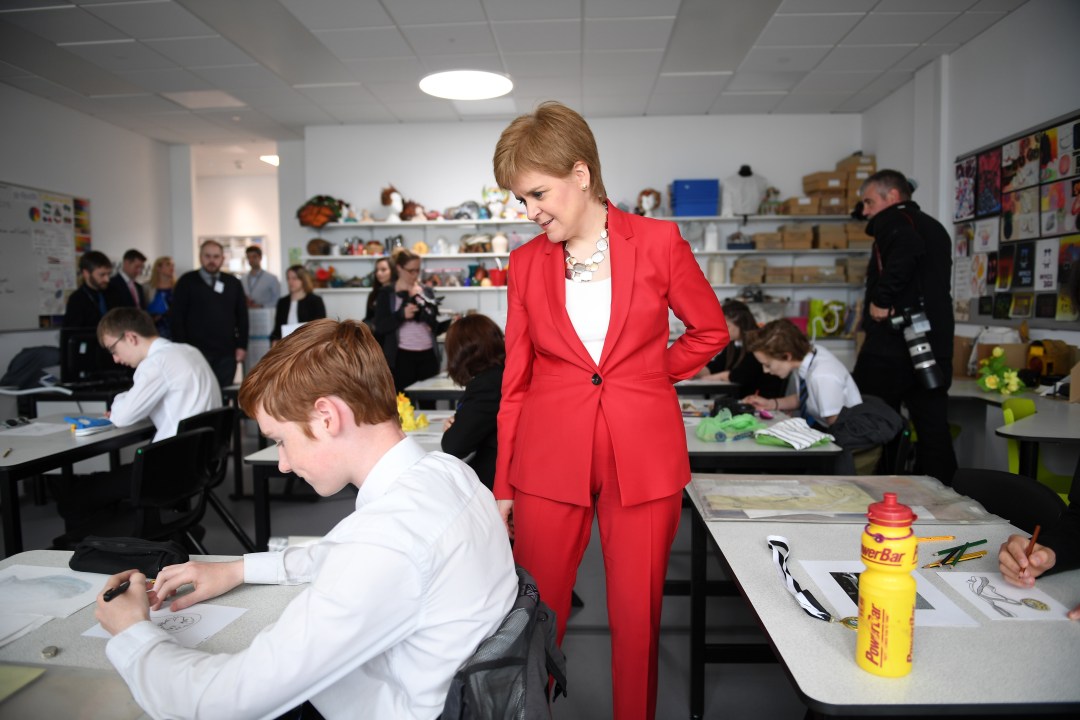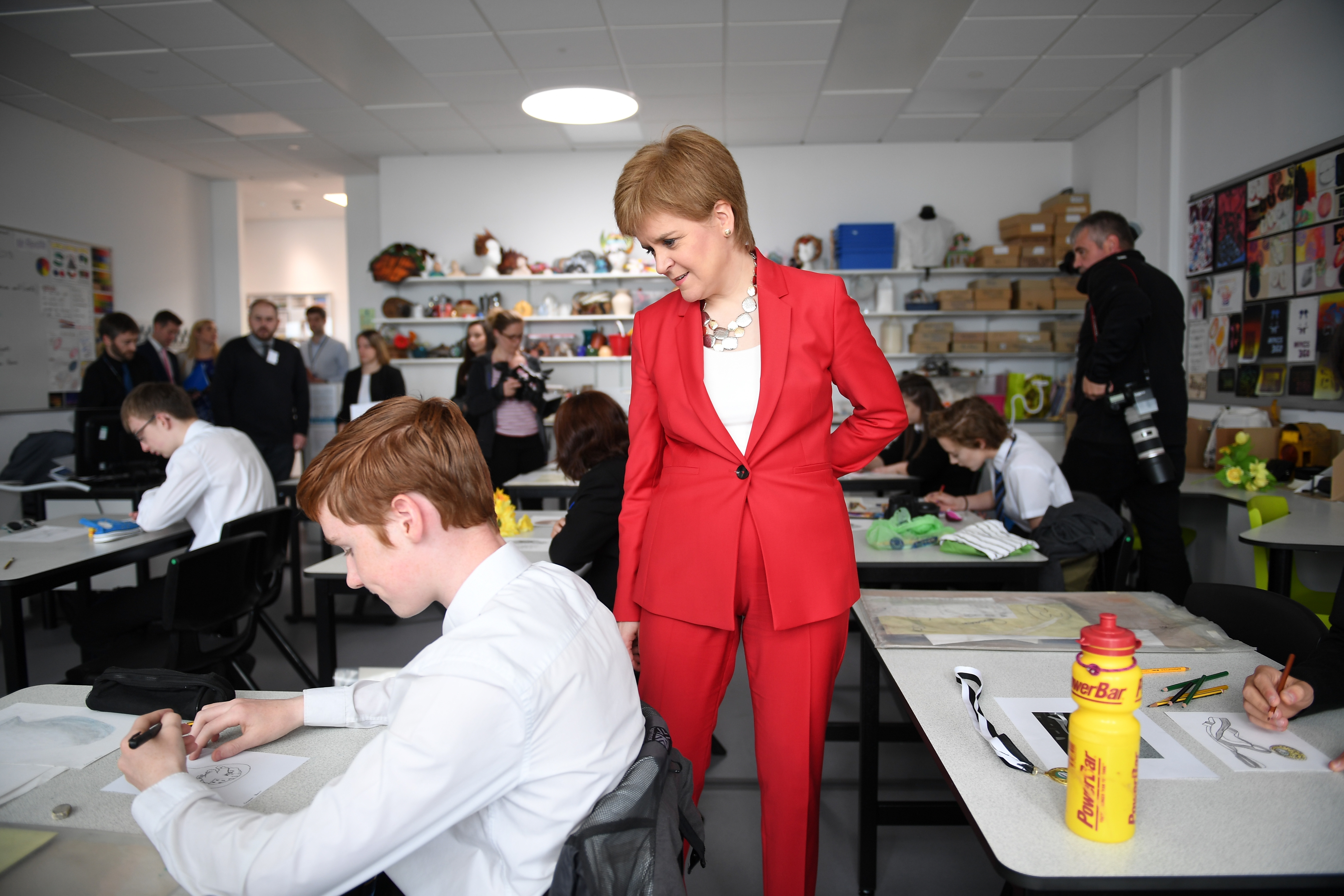There is a crisis brewing in Scottish education. Not the long-running crisis of attainment gaps, falling exam performance and limited external oversight. The emerging crisis is about getting children inside the classroom in the first place.
Scotland’s schools have been closed for 90 days now in response to the Covid-19 pandemic and are not due to return for another 55, and even then only part-time. This ‘blended learning’ approach will see pupils split their week between in-school learning and remote working from home. What that split will look like will vary from council to council. Schools in Edinburgh will only allow one-third of students to attend classes while in Fife high school pupils will have to make do with one day a week at first. Exams, which were cancelled this year, may also be delayed next year.
Sturgeon’s early promise that education would be her ‘number one priority’ has been quoted back to her
Sturgeon’s education minister John Swinney has been accused of sending mixed messages. He admitted to a BBC interviewer that it was ‘unlikely’ that schooling would return to normal in the next academic year. Amid rising anger from parents, Sturgeon insisted: ‘It is absolutely not the case that we are planning for blended learning – children learning from home for part of the school week – to last a year or anything like it.’ A poll taken during a Zoom session between Swinney and 4,000 parents showed 62 per cent had received no virtual contact from teachers and only a third said their children were provided with support.
A campaign group, Better Than This for Scotland’s Children, has been set up by Labour councillor Michael Marra to press ministers for ‘more places to learn, more adults to help teach, and more national resources for parents and teachers’. This being Scotland, however, Marra’s political affiliation is triggering more consternation in the nationalist outrage-industry than the failings his group has identified. The First Minister and her education minister should show more caution than their cheerleaders, for the disquiet over a potential lost year in Scottish education crosses political divides. The Glasgow Herald columnist Iain Macwhirter, not typically hostile to the Scottish government, branded Swinney’s plans ‘not so much blended as half-baked’. Even one of Nicola Sturgeon’s own expert advisors has suggested that, if new Covid-19 cases remain low, ‘schools should re-open as normally as possible’ on 11 August However, that professor has since appeared to revise her statement to declare herself ‘completely aligned’ and in ‘support’ of Sturgeon’s approach.
In what is a running theme in Scottish education, the divide is in significant part about inequality. Keeping schools closed as parents return to work poses problems across the board but parents with the financial means (and flexible employers) have a better chance of finding a workaround. Those on more modest incomes, however, will be at a loss, especially where they have previously relied on elderly parents or other relatives to provide childcare for free. The same goes for attainment. The Scottish government is spending £500 million in an attempt to close the gap between pupils from the most and least deprived areas, yet it is the former who are likely to suffer most from ongoing disruptions to in-classroom, face-to-face learning. Schools in the poorest parts of Scotland aren’t facing a lost year so much as a lost generation.
Nicola Sturgeon’s early promise that improving education would be her ‘number one priority’ has been quoted back to her many times in light of her government’s record. John Swinney was already embattled pre-coronavirus, with exam passes in core subjects down 10 per cent, teachers unhappy over standardised testing for primary one pupils, an increase in ‘multi-level teaching’ in deprived areas, and Scotland slipping in international rankings on maths and science. The Scottish government has been bounced into holding a review of its ‘curriculum for excellence’ after opposition parties outvoted it at Holyrood.
Despite all this, and to the bafflement of the SNP’s opponents, the party continues to enjoy extremely healthy polling leads. Nicola Sturgeon has taken a more cautious approach to Covid-19 than Boris Johnson’s government and Scots seemingly endorse that decision, with 81 per cent rating the Scottish government’s efforts good or very good compared to 41 per cent for the UK government. However, the SNP’s unstoppable momentum towards victory in the 2021 Scottish parliament election was in place before coronavirus hit and in spite of years of erratic policy and stagnation in results.
The ascendancy of nationalist and populist politics across the west has exposed the transience and contingency of values once thought non-negotiable. American evangelicals who fretted over the corrupting influence of the entertainment industry and the moral character of presidents rallied behind a sybaritic celebrity once he said the magic words on judicial appointments. Hungarians’ lively scepticism of political strongmen and an overbearing state dissipated when Viktor Orban came along with his brand of big-government nationalism. Generations of Scots have boasted that their education system was the envy of the world, yet the country keeps re-electing a government that has made Scottish schooling a byword for poor attainment and educational inequality. Nicola Sturgeon isn’t the only one whose priorities ring hollow.








Comments